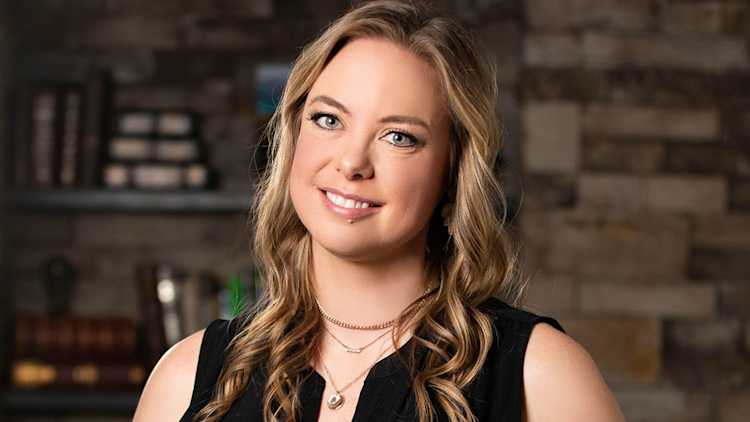Sharing a love of Canadian agriculture worldwide

After leaving her corporate agriculture career to raise her children and be more active on the family’s ever-growing ranch in Ituna, Saskatchewan, Adrienne Ivey wanted to keep a foot in the agriculture industry. Sharing her family’s story with the public was an opportunity that suited her perfectly.
Adrienne’s communication journey began after she and her husband were named Saskatchewan’s Outstanding Young Farmers in 2014. When mainstream media requests began pouring in, Adrienne realized how much people want to hear stories straight from the farm.
What began as a heightened presence on social media has now grown into YouTube video production, TEDx Talks, podcasts and international travel to share her story, and the stories of other Canadian farmers and the Canadian agriculture industry.
Why I talk about agriculture
This business venture really began after I realized the need for people to speak up for agriculture. It was during a period when there was so much misinformation about Canadian agriculture online and people were inexperienced with social media and separating what’s true from what isn’t. Even the idea that correct and incorrect information was being shared online was not yet widely acknowledged. This was about 15 years ago. I felt it was important to put accurate information out there to help balance any falsehoods or misleading stories.
People from other walks of life don’t have the privilege of seeing all the things we do on our cattle ranch. So, I share it with them openly.
Build intentional relationships
Once I’d built a name for myself in the industry through Twitter and blogging, I became involved in the wider agriculture community such as Ag in the Classroom, industry boards and agricultural organizations. This led to deeper learning and creating meaningful relationships with others in agriculture. I also cultivated many purposeful relationships with mainstream journalists in Saskatchewan and across Canada; I became their point of contact for agriculture-related articles. Even if I didn’t have much knowledge on a specific topic, I was able to connect them with someone who did.
Try different outlets
There are many methods of communication to reach the public, so I feel it’s important to continue pushing myself to try different avenues of speaking. The biggest thing is to be open to opportunities and brave enough to put myself into situations that are unknown to me.
For example, I was asked to do a TEDx Talk, which was a fantastic way of reaching audiences outside of agriculture. Over the years, schools and public libraries have run events that I spoke at. Continuing to put myself out there and being open to these opportunities is important.
Share with different audiences
Topics and the vocabulary I use differ based on who my audience is. When sharing with an agriculture-based crowd, there’s not much of a point in telling them how awesome agriculture is – they already know. Instead, I focus on inspiring them to share their stories and offer tricks to do so, including how to be effective in their communication.
Focus your efforts where you can make the most impact.
For example, focus your efforts where you can make the most impact. When speaking with an audience without an agriculture background, I share the good news about Canadian agriculture, what farmers are doing to reduce their carbon footprints, how they are involved in their local communities and the impacts of agriculture on the Canadian economy. This helps them relate the giant agriculture industry to the food on their tables while connecting all the dots along the way.
Connect with the consumer
Some tough conversations come along with this journey, but the benefits tend to outweigh the negative side of sharing our farm’s story. There’s no other feeling quite like seeing that light bulb moment when someone who has no connection to agriculture understands that every single farming family across Canada cares greatly.
When I start talking about the cool things we’re doing, I make sure they know I’m just an average farmer: “I’m nothing special,” I say. “Our family is just doing what all the other farming and ranching families across Canada are doing.” Seeing that realization on their faces is my favourite part of all.
Support each other
The largest challenge I have faced is seeing farmers disagree on the “right way” to share our stories, and what they consider to be the “right” or “wrong” way of farming. I expected backlash from activists, especially on more controversial topics such as animal agriculture and GMOs, but it’s very disheartening to see farmers disagreeing. When farmers support each other on this journey, we get further in terms of public trust.
Diversity in farms, and voices, is our strength and something we should be supporting.
Seek and accept opportunities
It’s hard to say what I most look forward to next. I’ve had some great opportunities in this venture, such as the TEDx Talk, and being invited to the McDonald’s worldwide conference to speak with restaurant owners about the sustainability of beef and raising beef cattle in Canada. I’m looking forward to the amazing opportunities that are to come.
From an AgriSuccess article by Jennifer Glenney.
Learn how LinkedIn can be used as the next tool in your farm marketing toolkit.
